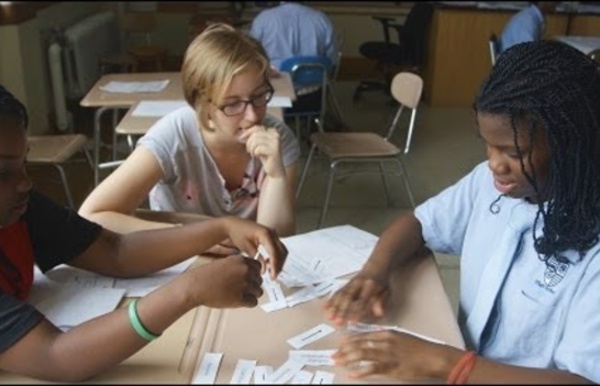



http://www.youtube.com/watch?v=hnzCGNnU_WM
Related: Aprenentatge per projectes • COLLECTION: Project-Based Learning (PBL) Resources • Inteligencia artificial • Project Based LearningProject Based Learning Resources, Examples About ETR Community EdTechReview (ETR) is a community of and for everyone involved in education technology to connect and collaborate both online and offline to discover, learn, utilize and share about the best ways technology can improve learning, teaching, and leading in the 21st century. EdTechReview spreads awareness on education technology and its role in 21st century education through best research and practices of using technology in education, and by facilitating events, training, professional development, and consultation in its adoption and implementation.
Life Tags - Photographs classified by Machine Learning 100 metres hurdles(258) 110 metres hurdles(1094) 1937 ford(5) 1941 ford(16) 1949 ford(30) 1952 ford(5) Promoting a PBL Mindset: The "Dimmer Switch" Approach Originally published May 9, 2017 – updated Jan 27, 2021. “Well, we did our project.” It was my third project debrief meeting of the morning with classroom teachers new to Project Based Learning, and it was the third time our conversation had started this way.
Why Your Project Needs a Verb Designing project-based learning (PBL) assignments opens up several decisions. The challenge that students will face, the assessments that measure their learning, the amount of voice and choice to offer, the calendar and length of the challenge—these are just some of the many facets of an effective PBL project. As we design a project, we may have trouble really focusing it.
Resources and Downloads to Facilitate Inquiry-Based Learning A Case for Curiosity: Hear from one educator on the value of asking “why?” and learn how to preserve and nurture a curious mindset. (Edutopia, 2016) 3 Rules to Spark Learning: Watch a short video to understand how student questions seed real learning. Talking About Text Structure in the PBL Classroom Project-based learning is often associated with STEM learning, but PBL is a powerful context for literacy learning as well. Many research-supported practices for developing literacy can be seamlessly embedded into projects. A meaningful and engaging context, as in PBL, can make instruction in research-supported practices even more effective (Guthrie et al., 2004; Guthrie et al., 2008). Strong readers pay more attention than weaker readers to how texts are structured or organized. Fortunately, paying more attention to text structure is something that we can teach to all readers. Research shows that this practice helps many readers, even young children and those with learning difficulties (Gersten, Fuchs, Williams, & Baker, 2001; Shanahan et al., 2010).
Student Historians: Inquiry-Based Learning in a Social Studies Class “One of the big challenges today is that students are inundated with the ability to access information, but don’t know how to answer the ‘so what’ question—how to interpret it,” Douglas Brisson, a National History Day judge and historian. YES! As a middle school teacher working with students enthralled with “googling-it,” but lacking the skills to effectively evaluate and analyze online sources, Mr.
Scaffolding the PBL Shift I remember my first year teaching freshmen Global Studies at a brand new Project Based Learning school. I was so excited to allow students to pursue their own paths in student centered learning. I gave them open-ended topics like imperialism to pursue with little guidelines and no rubrics. I thought the students could research and figure out what interested them and what was important all on their own. Fairly soon the students started coming to me and begging for guidance, and it wasn’t limited to struggling students. The most vocal students were the ones who had gotten all A’s in traditional classes.
Keeping Robots Friendly: Meet The Woman Teaching AI About Human Values Anca Dragan has a cool name, an impressive CV and an important job. While many roboticists focus on making AI better, faster and smarter, Dragan is also concerned about robot quality control. In anticipation of robots moving into every area of our lives, she wants to ensure our interactions with robots are positive ones. The computer scientist and robotics engineer is a principal investigator with UC Berkeley’s Center for Human-Compatible AI. “One particular area of interest is the problem of value alignment,” says Dragan. “How do you ensure that an artificially intelligent agent–be it a robot a few years from now or a much more capable agent in the future–how do you make sure that these agents optimize the right objectives?
Creating a Culture of Inquiry Inquiry is powerful. It can create student ownership in the classroom. It can validate the passions and interests of our students. However, creating a culture of inquiry takes constant work. Teachers need to establish it from the first day in the classroom, and work to keep it vital throughout the year. Here are some important things to know about creating that culture, and some ideas that you might consider.
I’ve been meaning to write this post after hearing an idea at PBL World 2015 in the keynote by Ramsey Musallam, an amazing speaker and high school chemistry teacher. Now that PBL World 2016 is almost upon us, I thought I’d better get this done so I can be ready to blog about this year’s events and ideas. Ramsey likened the learning cycle that happens in PBL to the classic “hero’s journey” first explained by mythologist Joseph Campbell in The Hero with a Thousand Faces (1949). Campbell described the basic narrative pattern as: A hero ventures forth from the world of common day into a region of supernatural wonder: fabulous forces are there encountered and a decisive victory is won: the hero comes back from this mysterious adventure with the power to bestow boons on his fellow man. How to Bring 'More Beautiful' Questions Back to School There are a lot of understandable reasons why questioning drops off in school. Foremost among them is time. “Time really conspires against questioning,” Berger said. “In the classroom there often isn’t time to let kids ask their questions.”